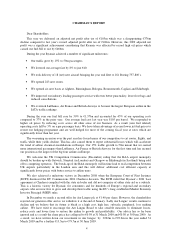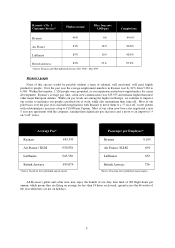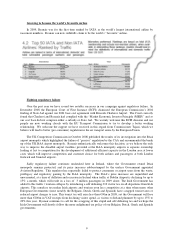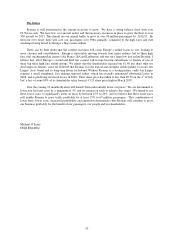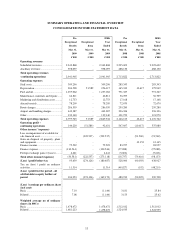Ryanair 2009 Annual Report Download - page 6
Download and view the complete annual report
Please find page 6 of the 2009 Ryanair annual report below. You can navigate through the pages in the report by either clicking on the pages listed below, or by using the keyword search tool below to find specific information within the annual report.
6
CHIEF EXECUTIVE’S REPORT
Dear Shareholders
The past year has been one of very strong traffic growth by Ryanair and - despite record high oil prices -
we still reported a substantial adjusted after tax profit, albeit one that declined by 78% to €105m. Ryanair
continued to relentlessly lower (non fuel) unit costs, reduce our fares, add new aircraft, new routes and new
bases. It is an incredible success story that the regional airline set up by Tony Ryan and his family in
Waterford in 1985 has in just 25 years grown to be the world’s largest international airline and the sixth largest
airline in the world (when the large U.S. carriers domestic traffic is included). Over the next 5 years we intend
to grow to become the second largest airline in the world, ranked only behind our guide and mentor Southwest
Airlines.
To get there Ryanair will have to continue to lower fares and costs, improve our industry leading customer
service, recruit, promote and incentivise bright, committed, talented people and continue to fight against the
dead hand of price regulation wherever it appears (it is always the enemy of lower costs and the consumer
interest). Above all we must continue to offer choice, competition and a lower fare alternative to the millions of
consumers who would otherwise be fleeced by Europe’s high fare, fuel surcharging flag carriers. We have
continued to deliver in each of these areas over the past 12 months.
Ryanair’s pricing
What makes Ryanair unique amongst Europe’s airlines is that only we are committed to offering the
lowest fares in every market. Only Ryanair is determined to repeatedly lower the cost of air travel. Last year
our average fare fell by another 8% to just €40, further widening the gap between our low fares and the high
fares of our European competitors. As Europe’s lowest fare airline, Ryanair maintains a policy of never
imposing a fuel surcharge, regardless of how high oil prices are. While most other airlines were raising fuel
surcharges last year, Ryanair absorbed these higher oil prices which was the direct cause of our large profit
decline. The majority of Europe’s flag carriers continue to levy high and (in my opinion) unjustified fuel
surcharges, despite the fact that oil prices have fallen back to under $60 per barrel. It is clear that these
surcharges bear little relationship to oil prices, yet remarkably National Consumer Agencies across Europe
have done nothing to challenge this flag carrier fuel surcharge rip off. Over the last 10 years our average fare
has fallen by 27% to just €40.




